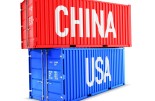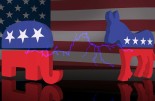Paul Krugman: Trump's blunt tariff measures are disastrous
Paul Krugman: Trump's blunt tariff measures are disastrous

This article was originally written in Dutch. This is an English translation.
Donald Trump's blunt tariff measures are having a disastrous impact on the American economy and on the position of the United States in the world. “It seems as if we have collectively lost our minds.”
By Joost van Mierlo
The American winner of the Nobel Prize in Economics, Paul Krugman, is one of the most vocal opponents of President Trump's economic policy. According to him, his relentless attacks on Trump's ‘insane policies’ prompted The New York Times to end his widely read column, which he had written for almost twenty-five years. He is continuing his column via Substack, where he now has 375,000 followers. They enjoy his merciless criticism on a daily basis.
Krugman visited the Netherlands in early May. He gave a lecture at Erasmus University, where he will be spending a lot of time in the coming years. Krugman wants to spend most of his time in Europe in the coming years to further refine his insights into the trade theory he developed, which he himself calls the “New Economic Geography”.
His first impression of the Netherlands in general and Rotterdam in particular is positive. 'If you look at the figures, the Netherlands, and Europe in general, should be in much worse shape than the United States. But when you walk around, you don't notice that. People look good, the shops and shopping trolleys are full, and life expectancy is higher. Money clearly isn't everything.
Nowadays, it is easy to say that globalisation is the cause of the problems facing many lagging regions. This is true, for example, of the Appalachians in the United States and the north of England, and although I am not very familiar with the situation here in the Netherlands, it will undoubtedly also apply here.
In the United States, it is called the “China Shock”. It is true that the relocation of production to China has caused many job losses in the United States. But we should not exaggerate. The total number of jobs lost is estimated at 1.5 to 2 million. That is not too many in a country where 1.5 million people lose their jobs or are laid off every month.
Of course, these figures do not tell the whole story. Some sectors and regions have been hit harder than others. Take furniture manufacturing, for example. Before China became a major player in world trade, there were hardly any furniture imports in the United States. That changed completely.
Furniture production used to be concentrated in the American state of North Carolina. The changes brought about by the China Shock meant that more than 300,000 workers in this region lost their jobs. This has had a disastrous impact on many towns in the area.
However, globalisation is not the main culprit. The influence of new technology is much greater. Take mining, for example.
We all know the stories from the past of men being sent into the dark depths with pickaxes to chop away at coal. Of course, it wasn't very healthy work, but for generations it provided a decent job that was passed down from father to son.
It must be possible to use targeted industrial policy to propel certain lagging regions into the mainstream.
That all changed as a result of technology. Nowadays, the top of a mountain is blown up with explosives and large machines scrape away the coal or whatever raw material is there. In addition, demand for coal has declined in recent years due to climate change, but it is technological innovation that has had the most disastrous consequences for employment in these regions.
The loss of a significant economic role has had disastrous consequences for many regions. You can see this in the United States, for example, where a state like Alabama has lagged behind relatively. But the average income in Alabama is still comparable to that in Canada or France.
However, it makes it clear that these kinds of economic figures do not tell the whole story.
If you go to the city of Birmingham in Alabama, you have a completely different experience than in Toronto in Canada. This is evident, for example, from people's life expectancy. In Alabama, it is 75 years, in Canada 81. Or from the percentage of adults between the ages of 25 and 54 who have a job. In Alabama, it is 78%, in Canada 89%.
This points to social disruption with far-reaching consequences in many regions. I already mentioned life expectancy. The leading cause of death in states such as Alabama and North Carolina is a category referred to as “Opiates, Alcohol and Suicide”. This cause of death is particularly high among people who have not attended university.
Social disruption is not new. In my lifetime, I have seen two phases of social disruption. First, there was the social disruption in many inner cities in the 1960s and 1970s. It was the result of industry leaving the inner cities. It caused massive unemployment among the coloured populations living there.
If someone had wanted to conduct a bizarre and unethical experiment, they might have thought: “Let's tackle the white community in rural areas next”. But that is exactly what has happened over the past few decades. It is completely understandable that this has led to political unrest.
Before I discuss how this problem can be tackled, it is important to describe the current situation in New York, for example. I have lived in this city for decades and have seen it change dramatically. Compared to the chaotic situation in the 1970s, the city is barely recognisable.
For example, the number of murders is 85% lower than in the 1970s, and New York is now one of the safest cities in the United States. This shows that something can be done about social disruption. The disruption of the past decades is the result of a development in which the knowledge economy has been the main driver of economic growth.
This growth was concentrated in areas that were already centres of knowledge. The reasons for this are often coincidental. New York owes its prominent role to its location at the end of the Erie Canal. The economic role of the Erie Canal has virtually disappeared, but it has ensured that New York is still a leading financial centre in the world today.
More than half of the economic growth in the United States in recent decades can be attributed to growth around New York and Silicon Valley. This makes for impressive economic figures, but the average resident of Alabama does not really benefit from the hundreds of billions that oligarchs such as Elon Musk and Mark Zuckerberg have amassed in recent years.
However, it is the people of Alabama who are paying the price for the stupid import tariffs introduced in the United States in recent months. This is primarily because products will become more expensive. But that is not even the main reason for the problems that will be caused. Many small and medium-sized businesses depend on imports for part of their production and will face higher production costs. These will be passed on to consumers.
I am not a free trade purist. Especially in these times of political uncertainty, it is important to preserve strategic sectors. But that does not mean that all production has to take place in your own country. I don't think Donald Trump would agree with me, but I don't see any problem with the production of advanced machines for manufacturing chips – we are indeed talking about ASML – taking place in the Netherlands. The days of offshoring may be over, but in addition to nearshoring, we should also be satisfied with friendshoring, i.e. the production of crucial products and services in friendly powers.
The previous American administration took important steps in this direction. There were all kinds of snags with the Chips Act, aimed at bringing more chip technology to the United States, and the Inflation Reduction Act, but they were steps in the right direction. It must be possible to use targeted industrial policy to propel certain lagging regions into the mainstream.
Globalisation is not the main culprit. The influence of new technology is much greater.
The biggest problem with the legislation mentioned, especially the Inflation Reduction Act, was that it could not be implemented on a large enough scale. The rotten political climate in the United States made that impossible. To win votes, projects were attributed to states that did not need them most. That is the political reality of today. Or perhaps we should say yesterday. We are currently living in a period of collective madness. At least in the United States. It is not such a bad idea to spend a little more time in Europe in the coming years.’
|
Paul Krugman Paul Krugman (1953) is an American economist specialising in trade theory. In 2008, he was awarded the Nobel Prize in Economics. He is one of the most respected economists in the world. He was a professor for many years, first at MIT and then at Princeton, but gained worldwide fame for his weekly columns in The New York Times. He has written numerous books, including The Return of Depression Economics (1999) and The Conscience of a Liberal (2007). Starting this summer, he will be a visiting professor at various European universities, including Erasmus University in Rotterdam. |








